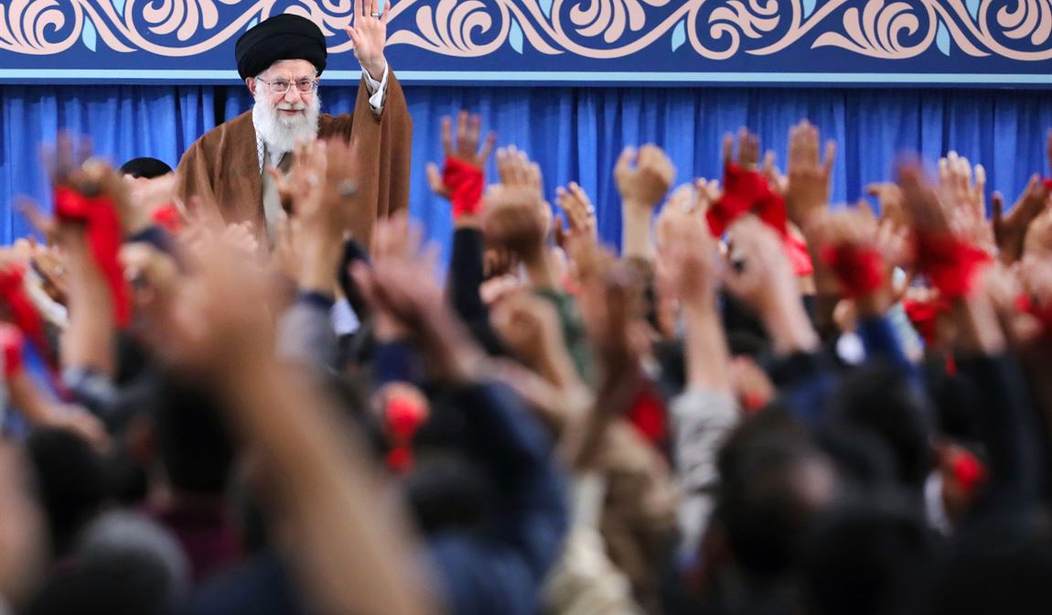When President Trump withdrew the United States from the Obama administration's unilateral, weak nuclear agreement with the Iranian regime, quite a few critics predicted that the move would draw our European allies closer to Tehran, while driving a wedge between the US and the rest of the West. In fact, quite a large number of Europe-based companies have declined to pursue business inside Iran, for fear of running afoul of America, risking the potential bite of sanctions. Nevertheless, the Europeans and Iranians recently affirmed their commitment to making the deal work:
The European Union and Iran are affirming their support for the international nuclear deal and say they aim to keep it alive despite U.S. President Donald Trump's decision to abandon the landmark pact. Ahead of EU-Iran talks on civil nuclear cooperation in Brussels Monday, EU Energy Commissioner Arias Canete said the deal is "crucial for the security of Europe, of the region and the entire world." He said the agreement curbing Iran's nuclear ambitions is working and that "we do not see any credible peaceful alternative." ... Iranian Vice-President Ali Akbar Salehi said: "I hope that we can enjoy the niceties of this deal and not let it go unfulfilled." Should the deal break down, he said, it would be "very ominous, the situation would be unpredictable."
The accord, which faced substantial bipartisan opposition in Congress, made massive concessions to the anti-American regime, which the US State Department has consistently identified as the world's top exporter of terrorism. The agreement's most fundamental flaw is the automatic expiration of Western-imposed restrictions, after which Iran would be a threshold nuclear-armed state -- an outcome that even President Obama effectively conceded. That would be the case even if Iran abided by every syllable of the arrangement, in spite of the regime's lengthy track record of cheating, subterfuge and deception. On that front, Tehran is once again seriously accused of flouting international obligations and pushing the envelope of military belligerence. They swear they've had no intention of seeking nuclear weapons, a lie that was entirely debunked by a major Israeli intelligence coup this year. The fact that they continue to develop and test nuclear delivery devices does not inspire confidence:
Recommended
Iran just test-fired an INF range ballistic missile capable of reaching Israel and Europe. This provocative behavior cannot be tolerated. https://t.co/EcPQ6MMjv7
— John Bolton (@AmbJohnBolton) December 1, 2018
Secretary of State Mike Pompeo on Saturday said Iran tested a medium-range ballistic missile, violating a United Nations resolution... "This test violates UN Security Council resolution 2231 that bans Iran from undertaking 'any activity related to ballistic missiles designed to be capable of delivering nuclear weapons, including launches using such ballistic missile technology ...'" Pompeo said in the statement...The UN body adopted the resolution, which endorsed the implementation of the Joint Comprehensive Plan of Action, also known as the Iran nuclear deal, in 2015. It does not, in fact, ban Iran from undertaking any activity related to ballistic missiles, a point of criticism for opponents of the deal. Instead, it says "Iran is called upon not to undertake any activity related to ballistic missiles," language that does not forbid Tehran from testing or make it a violation if it does so.A spokesperson for Iran's Foreign Ministry, Bahram Qassemi, rejected Pompeo's claim that the missile test contravenes the UN Security Council resolution, saying "the country's missile program is just for defense," according to a statement on the ministry's website on Sunday. "No UN Security Council resolution has banned Iran's missile program or missile tests," Qassemi said..."As we have been warning for some time, Iran's missile testing and missile proliferation is growing," Pompeo said in the statement. "We are accumulating risk of escalation in the region if we fail to restore deterrence. We condemn these activities, and call upon Iran to cease immediately all activities related to ballistic missiles designed to be capable of delivering nuclear weapons." Defense Secretary James Mattis echoed Pompeo's statement. Mattis said "the threat from Iran is multifaceted," adding that "right now the strategic level of threat from Iran is less worldwide than Korea's, but it is certainly significant regionally and it could grow beyond that if it's not dealt with."
This latest provocation has caused newfound consternation across the Atlantic, prompting an emergency meeting of the UN Security Council:
The United Nations Security Council has met behind closed-doors to discuss Iran's latest missile test, which the United States and other allies said may have been in violation of a three-year-old council resolution. The December 4 session ended with no joint statement despite a U.S. call for council members to condemn Iran's weekend ballistic missile test, which Washington described as "dangerous and concerning." ... After the council meeting, French Ambassador Francois Delattre said there was "widely-shared concern" at the council about Iran’s missile test and renewed France's call to Iran to halt all activities related to its missile program. U.K. Ambassador Karen Pierce said that the type of missile launched on December 1 went "way beyond legitimate defensive needs" and points to Iran's destabilizing behavior in the region. Tehran has neither denied nor confirmed the missile launch. Iran says its missile program is defensive and not aimed at building an arsenal of nuclear-tipped missiles.
The United States has reimposed pre- Iran nuclear deal sanctions against the regime, and has gone further, imposing additional sanctions. I'll leave you with Israeli Prime Minister Benjamin Netanyahu directing a warning at Hezbollah, an Iranian-backed terror group:

























Join the conversation as a VIP Member